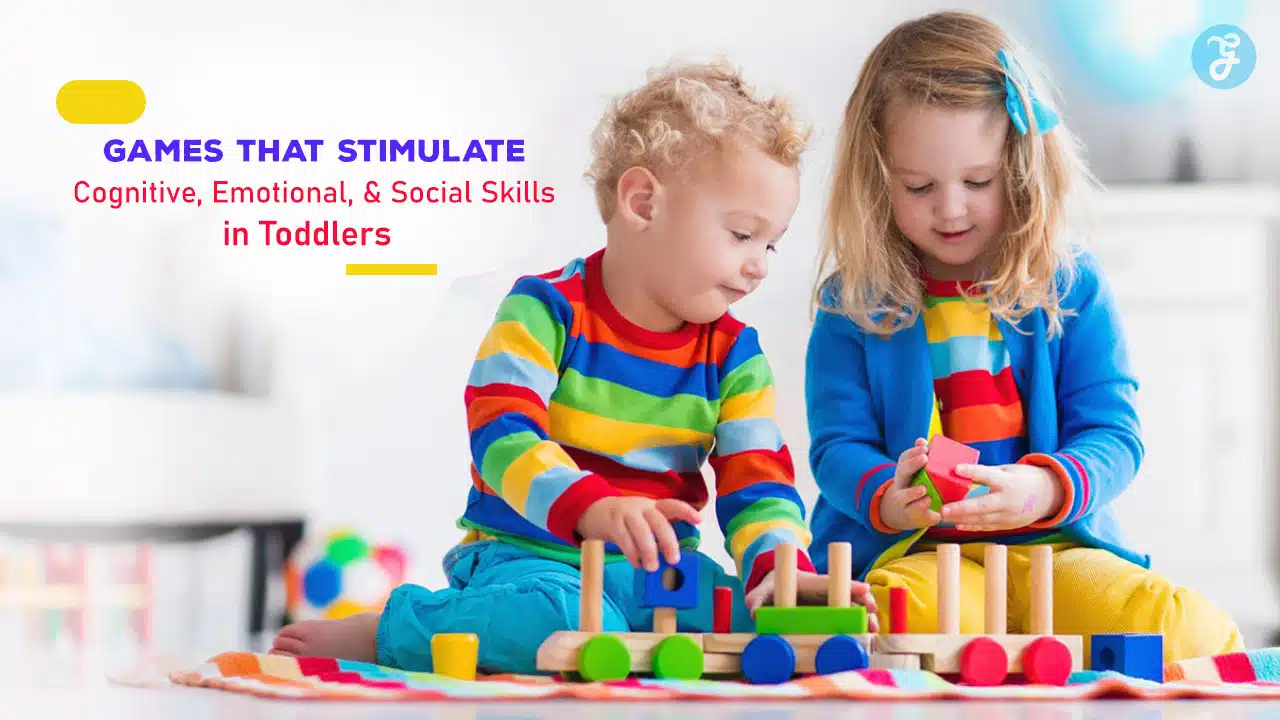Play is one of the most important ways toddlers learn and develop key skills. Engaging toddlers in well-thought-out games helps nurture cognitive growth, emotional intelligence, and social interaction.
Toddlers are curious explorers, constantly learning about the world around them, and these games provide the perfect environment for developing problem-solving abilities, emotional regulation, and relationship-building.
This guide will take a deep dive into 7 games that are designed to stimulate cognitive, emotional, and social skills in toddlers, ensuring holistic development in a fun and interactive way.
1. Simon Says
Simon Says is a fantastic game for enhancing a toddler’s ability to listen, follow directions, and control their impulses.
This classic game requires children to focus closely on verbal instructions and differentiate between when to act and when to hold back.
By doing so, it sharpens their cognitive ability to process commands and develop self-control, which are crucial for both learning and social situations.
How to Play:
- One child or adult is Simon and gives commands starting with “Simon says,” like “Simon says, touch your nose” or “Simon says, clap your hands.
- If “Simon says” is not said before the command, players should not follow the action. For example, if the leader says, “Jump up,” and players jump without hearing “Simon says,” they lose the round.
- Toddlers should focus carefully on the instructions and only act when the phrase “Simon says” is used. If they make a mistake, they can remain in the game for encouragement and learning.
How It Stimulates Development:
- Cognitive:
This game enhances focus, listening skills, and memory as toddlers must remember the rules and follow instructions.
- Emotional:
It encourages patience and emotional regulation, especially when toddlers have to stop themselves from acting impulsively.
- Social:
Playing in groups promotes interaction, turn-taking, and empathy, as toddlers learn to wait for others.
Extended Play Ideas:
- Movement variation:
Include different physical movements such as hopping, spinning, or dancing, which can also help with physical development and motor coordination.
- Leadership rotation:
Let each toddler take turns being Simon, helping them build leadership and communication skills.
2. Role-Playing Games (Pretend Play)
Pretend play allows toddlers to step into different roles, fostering creativity and imagination.
Whether they’re pretending to be a doctor, a chef, or a teacher, role-playing encourages children to explore the world around them and express their thoughts and emotions through imaginative storytelling.
This type of play is essential for developing empathy and understanding social roles, as toddlers start to grasp concepts like caring for others and problem-solving in various scenarios.
How to Play:
- Provide simple props:
Use toys or household items to set the scene—such as a doctor’s kit for medical role-play, cooking utensils for kitchen play, or costumes for pretending to be superheroes.
- Set a basic scenario:
Guide the toddler by suggesting scenarios like, “You’re the doctor, and I’m feeling sick.
What should we do?” or “Let’s pretend you’re cooking dinner for the family!”
- Encourage participation:
Let toddlers explore different roles and be creative with the narrative.
Prompt them to solve problems, such as “How can we fix this patient’s sore throat?” or “What should we cook today?”
How It Stimulates Development:
- Cognitive:
Enhances language development, problem-solving, and critical thinking by encouraging toddlers to think about how to solve problems in their pretend world.
- Emotional:
Helps toddlers explore and express emotions, such as empathy when caring for a sick patient or frustration when something doesn’t go as planned.
- Social:
Promotes communication, cooperation, and negotiation skills when playing with peers or adults.
Extended Play Ideas:
- Create play zones:
Designate specific areas for different types of role-play, such as a pretend kitchen, hospital, or office.
- Introduce challenges:
Add small challenges to the scenario, such as running out of ingredients while cooking, to encourage problem-solving and teamwork.
3. Puzzle Games
Puzzle games are excellent for developing cognitive skills like spatial awareness, problem-solving, and fine motor coordination.
When toddlers work to fit pieces together, they enhance their ability to think logically and persist through challenges.
Completing a puzzle also provides a sense of achievement, which boosts confidence and emotional resilience.
How to Play:
- Choose age-appropriate puzzles:
Start with large-piece wooden puzzles or foam puzzles with simple shapes, animals, or numbers.
As toddlers improve, introduce more complex jigsaw puzzles.
- Encourage exploration:
Allow toddlers to explore the puzzle pieces and figure out how they fit together, offering guidance when necessary but letting them solve most of it independently.
- Praise effort:
Celebrate when they finish the puzzle, emphasizing the effort they put in rather than just the outcome.
This builds their perseverance and love for learning.
How It Stimulates Development:
- Cognitive:
Develops problem-solving skills, enhances hand-eye coordination, and promotes shape and color recognition.
- Emotional:
Builds patience, persistence, and the ability to cope with frustration, as toddlers learn to keep trying until the puzzle is completed.
- Social:
When played with others, puzzles encourage cooperation and sharing, as toddlers can work together to solve the puzzle.
Extended Play Ideas:
- Themed puzzles:
Introduce puzzles with themes like animals, vehicles, or numbers to enhance their learning about specific topics.
- Time challenges:
For older toddlers, create a fun challenge by timing how quickly they can complete the puzzle to add excitement and encourage them to improve.
4. Musical Chairs
Musical Chairs is a high-energy game that combines physical activity with cognitive and social engagement.
Toddlers must pay close attention to the music and their surroundings, quickly adapting to the situation when the music stops.
This game is great for teaching social interaction, including how to handle competition, as well as emotional regulation when they don’t find a chair.
How to Play:
- Set up chairs in a circle:
Place one less chair than the number of players in the game.
- Play music:
While the music is playing, toddlers walk around the chairs.
- Stop the music:
When the music stops, the toddlers must quickly find a chair to sit in.
The one who doesn’t get a chair can stay in the game for encouragement (no elimination version), or the group can continue with fewer chairs each round.
How It Stimulates Development:
- Cognitive:
Enhances auditory processing, quick thinking, and spatial awareness, as toddlers must act quickly when the music stops.
- Emotional:
It helps toddlers learn how to manage their emotions, especially when they don’t win or can’t find a chair.
Builds emotional resilience and the ability to cope with disappointment.
- Social:
Encourages turn-taking, group play, and learning about friendly competition.
It’s a fun way to interact with others while playing by the rules.
Extended Play Ideas:
- Non-elimination version:
Instead of removing children from the game, encourage all players to keep participating, fostering teamwork and reducing competitiveness.
- Themed music:
Use different genres of music or songs toddlers are familiar with to make the game more engaging.
5. Memory Card Game (Matching Pairs)
The memory card game is an excellent tool for building a toddler’s memory, concentration, and visual recognition.
It involves matching pairs of cards based on their pictures, such as animals, numbers, or objects.
By engaging in this game, toddlers enhance their cognitive abilities and also learn patience and turn-taking when playing with others.
How to Play:
- Set up cards face down:
Lay out a set of matching picture cards face down on a table or the floor.
- Take turns flipping cards:
Each player takes turns flipping over two cards, trying to find matching pairs.
If they match, the player keeps the cards.
If not, the cards are turned back over, and the next player takes their turn.
- Continue until all pairs are found:
The game ends when all the pairs have been matched, and the player with the most pairs is the winner.
How It Stimulates Development:
- Cognitive:
Improves memory, attention, and concentration as toddlers must remember the location of different cards.
- Emotional:
Teaches toddlers to manage their emotions, especially when they don’t find a match or when another player gets a pair.
- Social:
Promotes turn-taking, patience, and cheering on peers as toddlers wait for their turn and encourage others.
Extended Play Ideas:
- Themed card sets:
Use different card themes like animals, fruits, or vehicles to enhance vocabulary while playing.
- Difficulty levels:
Start with fewer pairs for younger toddlers, and gradually increase the number of pairs as they improve.
6. Hide and Seek
Hide and Seek is a game that develops a child’s cognitive skills by encouraging them to think strategically about hiding places and how to find others.
It also nurtures emotional growth, as toddlers practice patience while waiting to be found and cope with separation from the group.
Additionally, it promotes social skills by encouraging cooperation and interaction.
How to Play:
- One player counts while others hide:
Choose a player to count to 10 (or 20) while the others hide.
Make sure hiding places are safe and accessible for toddlers.
- The seeker searches for hidden players:
Once the seeker finishes counting, they must find the hidden players.
- Take turns being the seeker:
Rotate the role of the seeker so that every toddler has a chance to hide and search, making the game more inclusive.
How It Stimulates Development:
- Cognitive:
Enhances problem-solving skills and spatial awareness, as toddlers decide on hiding spots and figure out where others might be hiding.
- Emotional:
Builds emotional resilience and coping skills, especially when separated from the group.
Encourages the ability to manage excitement or fear.
- Social:
Fosters group interaction, cooperation, and patience, as toddlers learn to take turns being the seeker and follow the rules.
Extended Play Ideas:
- Indoor or outdoor versions:
Hide and Seek can be played indoors with soft objects or outdoors in a safe, supervised environment, adding variety to the game.
- Guided hints:
For younger toddlers, give small hints to make finding others easier and to avoid frustration.
7. Building Block Games
Building blocks such as Lego, Mega Bloks, or wooden blocks encourage creativity, problem-solving, and motor skill development.
When toddlers engage in block-building, they must think critically about structure, balance, and design, all while working on their fine motor skills.
Building blocks also support emotional development by teaching persistence, patience, and pride in creation.
How to Play:
- Provide a variety of blocks:
Offer different types of blocks in various shapes and sizes to stimulate creativity.
- Encourage free play:
Let toddlers use their imagination to build whatever they like, whether it’s towers, houses, or cars.
- Work together:
Guide them through the process of planning and building, but allow them to solve problems independently.
If playing in a group, encourage toddlers to collaborate on creating something together.
How It Stimulates Development:
- Cognitive:
Improves problem-solving, spatial reasoning, and motor coordination by challenging toddlers to think about how to build stable structures.
- Emotional:
Builds patience and resilience, as toddlers must work through the frustration of blocks falling or plans not working out as expected.
- Social:
Promotes teamwork, cooperation, and sharing ideas when playing with others. Toddlers learn to communicate and collaborate on joint projects.
Extended Play Ideas:
- Building challenges:
Set specific challenges, like building the tallest tower or constructing a bridge, to add complexity as toddlers grow more skilled.
- Creative storytelling:
After building, encourage toddlers to create stories around their structures, enhancing both imaginative and language development.
Wrap Up
The early years of a child’s life are critical for cognitive, emotional, and social development, and games that stimulate these areas can have a profound and lasting impact.
The 7 games detailed here—Simon Says, Role-Playing Games, Puzzle Games, Musical Chairs, Memory Card Game, Hide and Seek, and Building Block Games—are more than just fun activities; they’re tools for growth.
These games challenge toddlers to think creatively, solve problems, express emotions, and interact with others, helping them develop into well-rounded individuals.
Incorporating these activities into your toddler’s daily routine ensures that they learn through play, in an environment that is supportive, stimulating, and enjoyable.





































